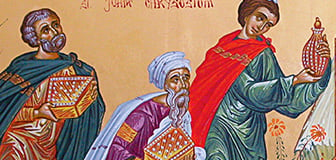Stewardship Sermon 2021
Jesus spoke of love and showed compassion. He taught us by his example to love one another and to be compassionate toward those in need. In the Gospels, we read of the compassion of Jesus:
When Jesus landed and saw a large crowd, he had compassion on them and healed their sick (Matthew 14:14).
Jesus had compassion on them and touched their eyes. Immediately they received their sight and followed him (Matthew 20:34).
…he had compassion on them, because they were like sheep without a shepherd (Mark 6:34).
Compassion can often mean kindness and sympathy. In these verses, it means something deeper and much more powerful. “And he had compassion” is translated from the Greek ἐσπλαγχνίσθη (esplachNEEsthee) and comes from the root word in Greek for “guts.” In other words, it is compassion and concern that are felt in one’s guts – a compassion that is felt in a deeply physical way. Compassion felt in this way compels us to respond with love and deep concern.
In the parable of the Good Samaritan, Jesus says “But a certain Samaritan, as he journeyed, came where he was: and when he saw him, he had compassion on him…” (Luke 10:33).
In the parable of the Prodigal Son Jesus says, "But when he was yet a great way off, his father saw him, and had compassion, and ran, and fell on his neck, and kissed him"(Luke 15:20).
These stories reflect the love and compassion that Jesus has for his people. His compassion inspires and challenges each one of us to live compassionately.
This understanding of the full meaning of compassion in the New Testament means that another person’s suffering becomes our own suffering. Compassion in this sense can change the way we live and care for others and for our community. When we feel this physical type of compassion, we are fully and physically engaged. We serve others and care for our community with love.
To love in the way Saint Paul writes to the Christians at Corinth, when he says, “…the greatest of these is love,” means we can’t live without compassion for others. Love and compassion are not expressed only in our offerings of money and other love and compassion.
The love that Saint Paul describes in his letter to the Christians at Corinth is an expression of stewardship. Stewardship is everything we do after we say “I believe.” Stewardship is about how we live our lives and make our choices. That means that stewardship is about love and love is about stewardship.
Love and stewardship are inseparable when we consider God’s blessings in our life. We use God’s blessings with love and compassion for others and to honor, worship and give thanks to him.
Our parishes can be transformed, becoming beacons of Christian love as we care for one another, face challenges together, and serve our neighbors. We would be known as Christians by the love and compassion we embody as a parish family.
We are called to be compassionate stewards, placing the needs of others before our own. Scripture is filled with passages of God’s call for us to be generous, loving, compassionate givers. Saint Paul’s Second Letter to the Corinthians tells us of God’s call for us to “excel in the grace of giving.” We are “hard-wired” to live as members of the Body of Christ and serve our larger community with compassion and love.
The priority of compassionate stewardship is not paying the congregation’s bills. It is about how we, as a community, can do God’s work with love and compassion. It is less about the parish’s need to receive, and more about our need to give. It is our generosity with the gifts and blessings God has entrusted to us. Compassionate stewardship is an attitude and a way of life.
